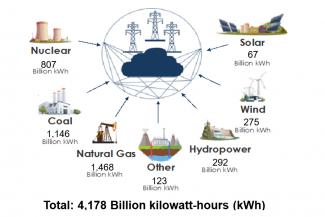The Summary Report of the Tri-Lab Workshop on Modeling & Analysis of Current & Future Energy Systems, which was hosted by the National Energy Technology Laboratory (NETL), has been released.
The workshop was organized by the three key U.S. Department of Energy’s (DOE) applied energy laboratories, NETL, the National Renewable Energy Laboratory (NREL) in Colorado and Idaho National Laboratory (INL). Their goal was the development of a shared set of best practices and approaches as a basis for establishing a common suite of modeling and optimization tools to support the design, analysis, and optimization of advanced, integrated energy systems throughout the nation.
Held at NETL’s Pittsburgh site from April 25-26, 2019, the workshop served as a follow-up to a workshop held in 2018 at the behest of DOE Undersecretary for Energy Mark Menezes to develop a vision, roadmap, and multi-year program plan to identify technology and operational gaps associated with future energy systems. The workshop also sought to provide a basis for coordination of opportunities and efforts to address these challenges via research and development (R&D) activities, leading to substantial improvements in energy system performance, environmental impact, and long-term sustainability.
Among the technical areas identified in this first workshop was the need for integrated systems analysis, modeling, and optimization, including development of a common tool set to provide unprecedented understanding of the current and future U.S. energy infrastructure and needs.
According to NETL’s David Miller, senior fellow for process systems engineering, achieving next generation energy systems is a significant challenge that modeling and analysis can help address. Models and the associated analysis approaches can vary significantly in purpose; hence, a broad suite of models is often needed to meet the range of analysis needs.
Over the course of the two-day workshop, participants identified how modeling and analysis can be used for energy system design, optimization, and planning to help identify opportunities to enhance the performance and potential of current and future energy systems, with a specific focus on integrated, hybrid energy systems.
Discussions focused on modeling and analysis tools at three scales: (1) energy processes and plants, (2) electricity grid and market interactions, and (3) multi-year planning horizons to consider future energy system scenarios. In addition, issues and opportunities related to bridging across these scales were discussed as well as opportunities for integrated modeling and experimentation. Following discussions focused on tools and capabilities, three parallel sessions identified opportunities for modeling and analysis to contribute to the development and demonstration of three tightly coupled hybrid energy system concepts.
The presentations and discussions provided insight on leveraging expertise and capabilities across each of the applied energy areas to ensure that energy system researchers and developers have access to a complementary suite of tools that utilize well-understood assumptions and analysis approaches. Specific goals were to:
• Identify relevant tools for energy system design, operation, optimization, and planning.
• Clarify key purposes/applicability of available models and tools. This would include (a) key assumptions and data needs and (b) strengths and limitations.
• Identify gaps among existing tools that, if addressed, would enable better support to energy system planning.
• Identify the unique roles of each modeling scale (temporal and spatial) in addressing technology development and planning challenges.
• Develop a strategic plan for energy system modeling and analysis. Such a plan should (a) establish a holistic approach to ascertain unique contributions of each energy source in either coordinated or tightly coupled energy systems, (b) consider technical and economic performance of all energy sources within various market structures, and (c) link to tactical application of toolsets for demonstration projects.
• Identify opportunities and challenges to establishing a common platform for energy system planning.
• Build new connections across the laboratories for future work.
Key outcomes from the workshop included the need for:
1. New tools for conceptual design of inherently dynamic hybrid processes to enable integrating multiple energy sources in new ways.
2. Improved understanding how hybrid systems can perform in markets with highly variable electricity prices that continue to evolve, as well as how they can perform in markets for new and existing products.
3. Detailed collaborative analysis to evaluate the viability and research needs of a pilot-scale program based on several hybrid case studies.
4. Specific new tools and capabilities to facilitate development of the energy systems of the future.
The full report detailing the results of the workshop can be viewed here.
NETL is a U.S. Department of Energy (DOE) national laboratory that produces technological solutions for America’s energy challenges. From developing creative innovations and efficient energy systems that make coal more competitive, to advancing technologies that enhance oil and natural gas extraction and transmission processes, NETL research is providing breakthroughs and discoveries that support home-grown energy initiatives, stimulate a growing economy, and improve the health, safety, and security of all Americans.




